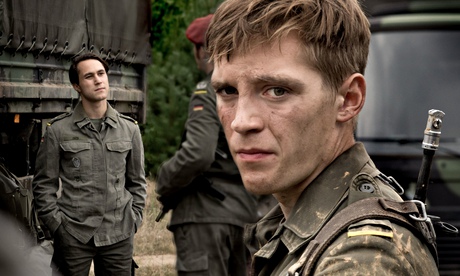
Welcome to Germany in 1983, a country divided since the end of the second world war.
Moritz Stamm is a West German army officer, with a love of music, dancing and hanging out with his friends. Martin Rauch is an East German border guard with a close family and a desire to change the world. The twist? Moritz and Martin are the same person, an East German spy sent to infiltrate the West German army and report on its military secrets.
That’s the premise behind Germany’s most eagerly awaited drama, Deutschland ’83, an eight-part series previewed at the Berlin film festival last week which aims to transform German television.
“It’s totally new for German TV,” said Anna Winger, the American novelist who co-wrote the show with her German husband Jörg. “In Germany, the most popular programmes are still TV movie events, which air over a couple of nights in the week or long-running procedurals. There aren’t really drama series like this.”
It’s not just the structure that’s groundbreaking, for Deutschland ’83, with its focus on Pershing II, peace protests and parties, is part of a wave of popular and critically acclaimed work focusing on the time immediately before and after the collapse of the Berlin Wall, which stood from 1961 to 1989.
Eugen Ruge’s decade-spanning debut about an East German family, In Times of Fading Light, was a bestseller in Germany, while Uwe Tellkamp’s prize-winning 2008 novel The Tower, set in the dying days of the GDR, was the basis of a hit two-part television film and received rave reviews on its English translation last year.
Maxim Leo’s memoir Red Love: The Story of an East German Family has sold similarly well, while East German writer Christa Wolf’s novels were recently reissued with new translations, which hew closer to Wolf’s original ideas, exorcising some zealous editing in adherence to the GDR party line.
Life in the west is attracting attention, too. Christiane F, whose memoir of being a teenage heroin addict in West Berlin, We Children of Bahnhof Zoo, inspired a 1981 film by Uli Edel, produced a sequel in 2013, My Second Life, detailing what happened after she found herself famous.
The original memoir has been republished, while the film remains a cult favourite, most recently mentioned in Christopher Brookmyre’s crime novel Dead Girl Walking.
Meanwhile, the latest book from Peter Schneider, best known for the haunting 1982 novella The Wall Jumper, is Berlin Now, a non-fiction look at how the city has again become “the capital of creative people from around the world”, and at Schneider’s ambivalence towards his home city, post-Wall.
Nico Hofmann, chairman of the board of UFA Fiction, which adapted Tellkamp’s The Tower for TV and is the team behind Deutschland ’83, said: “Many of the bestselling books in Germany of the last five years have looked at that time – it’s partially because there are so many marriages now of East and West and people are curious about what life was like before. If you’re of a younger generation you know nothing about it. It’s a nostalgia moment and it seems really unreal to people to see how different life was.”
UFA marked last November’s 25th anniversary of the fall of the Berlin Wall with two fact-based TV movies, The Resignation and Bornholmer Street, but Hofmann said that Deutschland ’83 tries something new.
“I feel as though we’ve made so many films about the Third Reich that we’ve reached a stopping point,” he said. “I think there are many interesting stories to be told of the two Germanys. There are so many stories we never heard until the Wall came down in 1989 and some of those tales we’re only just hearing now.”
It’s clear that the vibrancy of the Wingers’ tale – a coming-of-age story filled with secrets and lies – has helped drum up interest abroad. It was announced last week that US cable channel Sundance would co-produce the show, making it the first full-length German TV series to air on US television. Global distribution rights will be handled by FremantleMedia International.
“I think it’s a great era to focus on,” said Winger. “The show is set in 1983 because it’s about the future of Germany, how they get to the point where the Wall falls and the two Germanys comes together and, in retrospect, 1983 seems like the clear beginning.”
Hoffman said the key to the show’s appeal was simple. “It’s very funny,” he said. “I think that’s because Anna Winger is American and has an outsider’s view. If a German alone had written this they would have been too close and it have all been too serious. Anna and Jörg have made this fun.”

